Business Law and Ethics: UK Parliamentary Sovereignty After Brexit
VerifiedAdded on 2023/06/11
|7
|2133
|54
Report
AI Summary
This report examines the impact of Brexit on the United Kingdom's parliamentary sovereignty, arguing that leaving the European Union allowed the UK to regain its independence in lawmaking and cross-border transactions. Before Brexit, the UK's sovereignty was undermined by EU laws and regulations, which influenced major policy decisions and limited the autonomy of the British Parliament. The report highlights key issues such as trade, the single market, and the movement of citizens, noting challenges and opportunities for the UK in establishing its own policies and attracting international investment. While Brexit has restored sovereignty, it also presents challenges in areas like education, trade, and political development, requiring the UK to navigate a new landscape to ensure economic growth and stability. Desklib offers similar solved assignments to aid students.
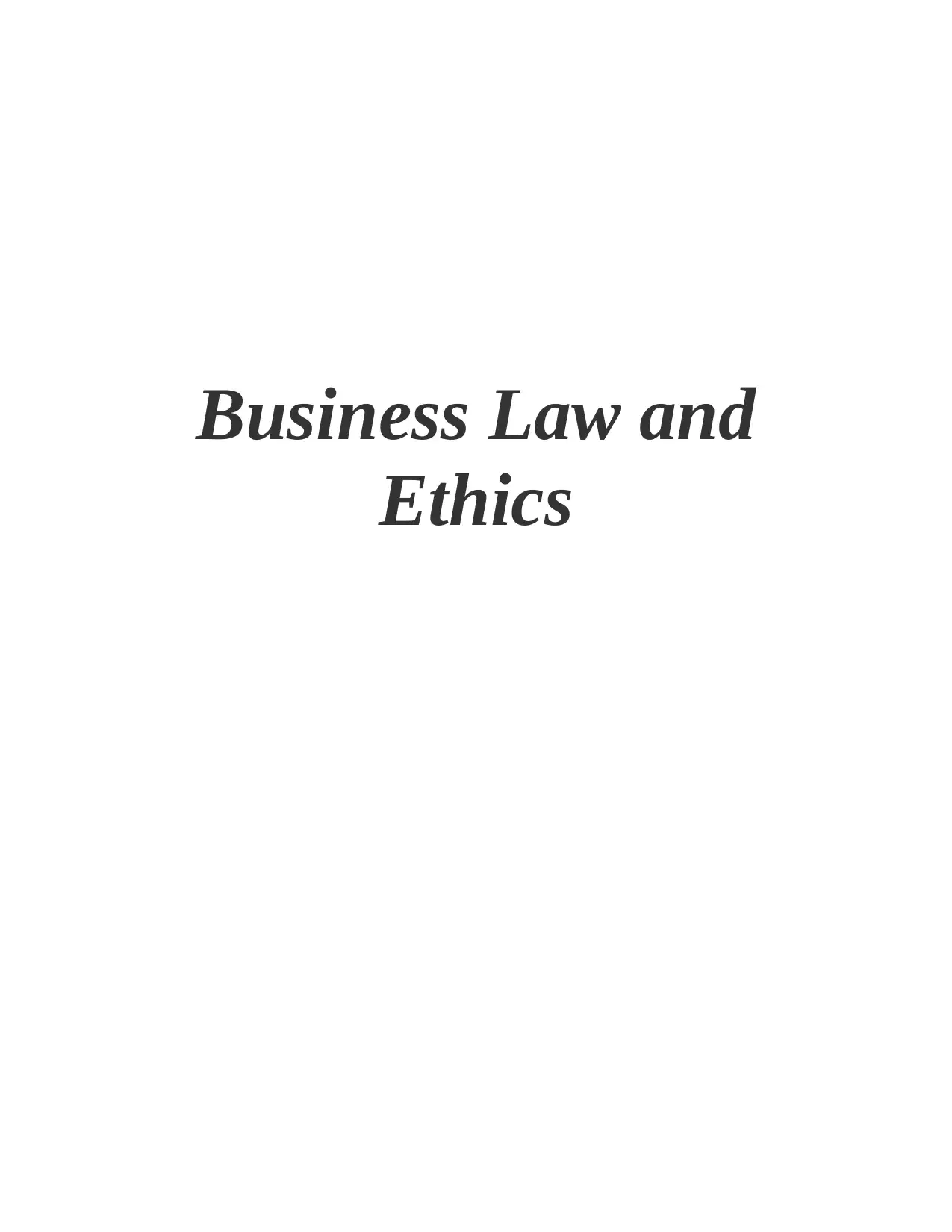
Business Law and
Ethics
Ethics
Paraphrase This Document
Need a fresh take? Get an instant paraphrase of this document with our AI Paraphraser
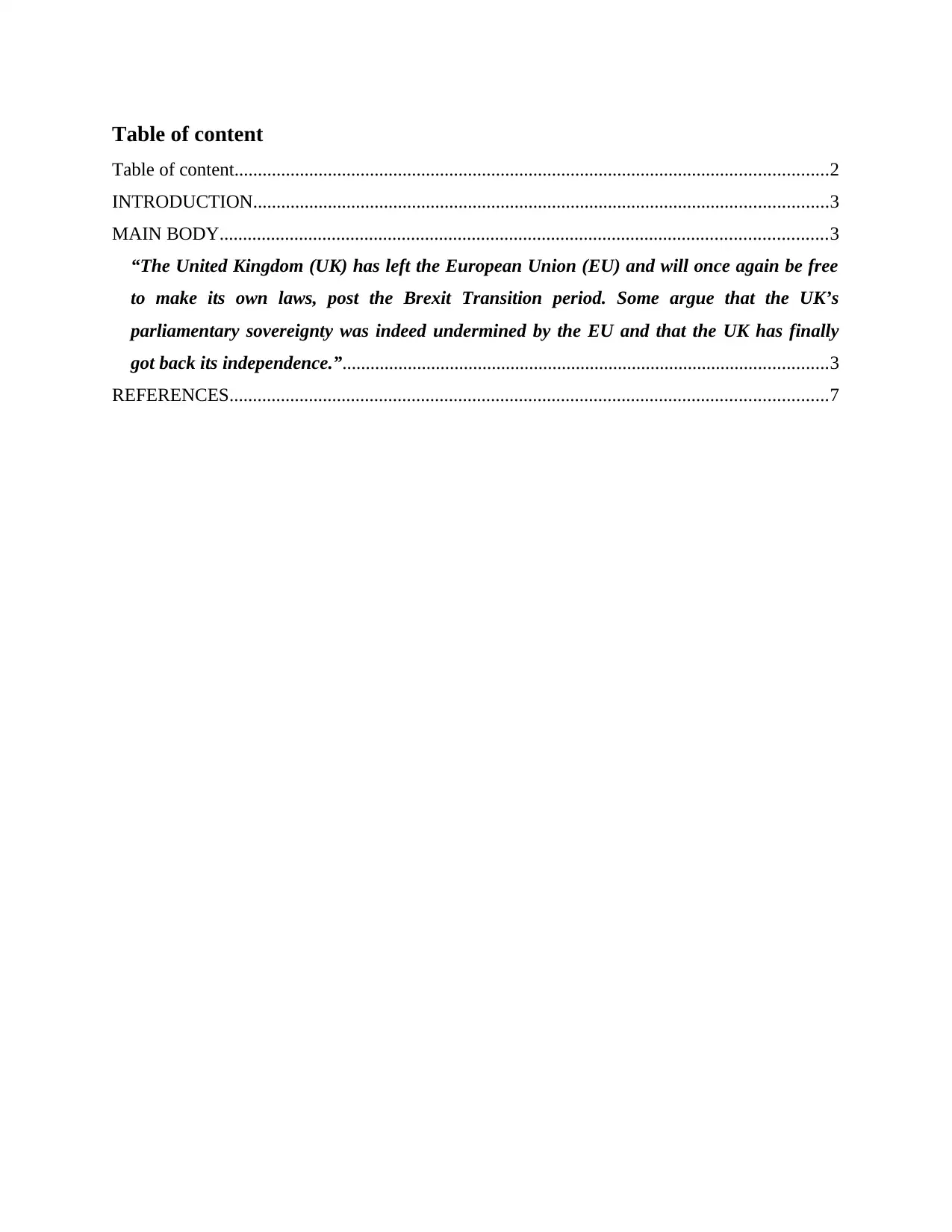
Table of content
Table of content...............................................................................................................................2
INTRODUCTION...........................................................................................................................3
MAIN BODY..................................................................................................................................3
“The United Kingdom (UK) has left the European Union (EU) and will once again be free
to make its own laws, post the Brexit Transition period. Some argue that the UK’s
parliamentary sovereignty was indeed undermined by the EU and that the UK has finally
got back its independence.”........................................................................................................3
REFERENCES................................................................................................................................7
Table of content...............................................................................................................................2
INTRODUCTION...........................................................................................................................3
MAIN BODY..................................................................................................................................3
“The United Kingdom (UK) has left the European Union (EU) and will once again be free
to make its own laws, post the Brexit Transition period. Some argue that the UK’s
parliamentary sovereignty was indeed undermined by the EU and that the UK has finally
got back its independence.”........................................................................................................3
REFERENCES................................................................................................................................7
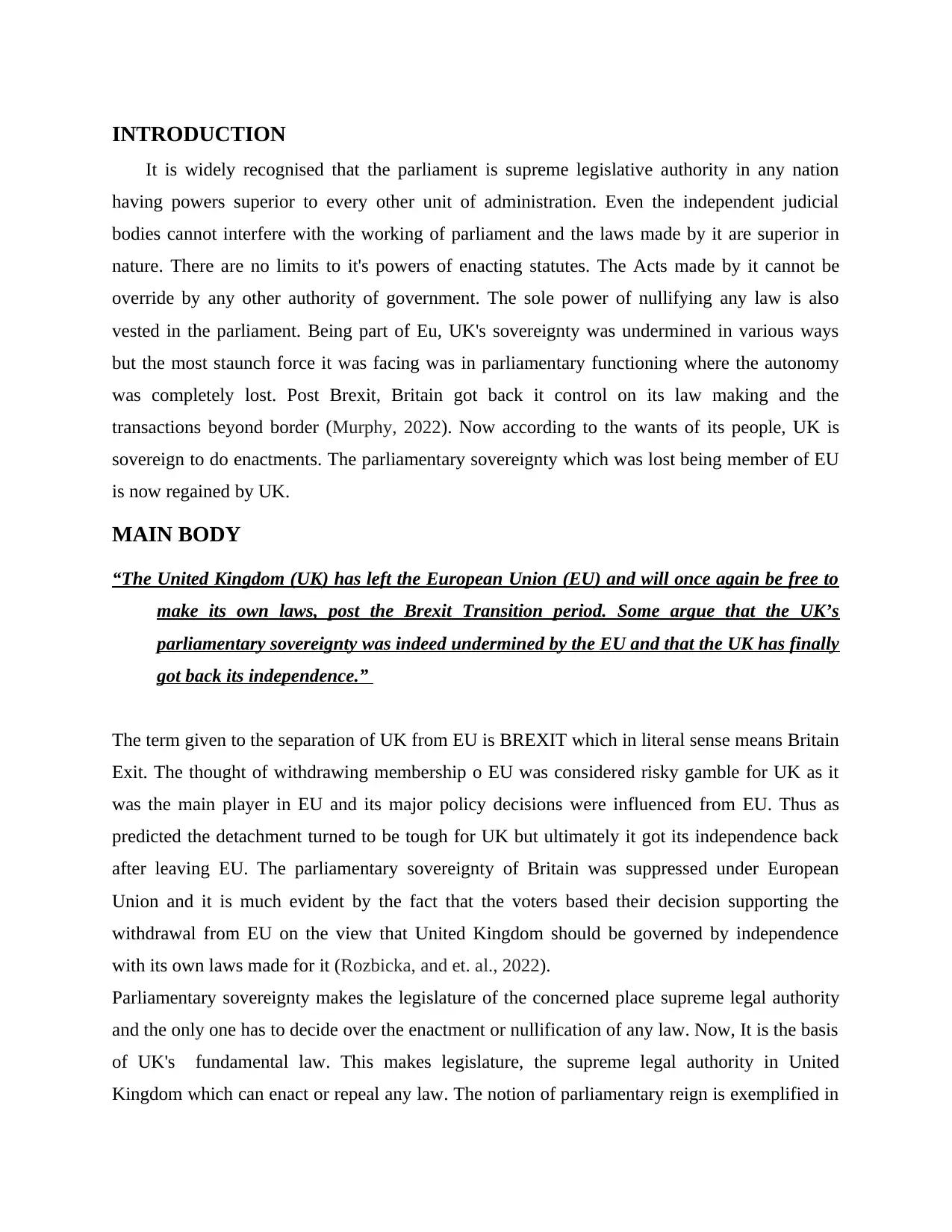
INTRODUCTION
It is widely recognised that the parliament is supreme legislative authority in any nation
having powers superior to every other unit of administration. Even the independent judicial
bodies cannot interfere with the working of parliament and the laws made by it are superior in
nature. There are no limits to it's powers of enacting statutes. The Acts made by it cannot be
override by any other authority of government. The sole power of nullifying any law is also
vested in the parliament. Being part of Eu, UK's sovereignty was undermined in various ways
but the most staunch force it was facing was in parliamentary functioning where the autonomy
was completely lost. Post Brexit, Britain got back it control on its law making and the
transactions beyond border (Murphy, 2022). Now according to the wants of its people, UK is
sovereign to do enactments. The parliamentary sovereignty which was lost being member of EU
is now regained by UK.
MAIN BODY
“The United Kingdom (UK) has left the European Union (EU) and will once again be free to
make its own laws, post the Brexit Transition period. Some argue that the UK’s
parliamentary sovereignty was indeed undermined by the EU and that the UK has finally
got back its independence.”
The term given to the separation of UK from EU is BREXIT which in literal sense means Britain
Exit. The thought of withdrawing membership o EU was considered risky gamble for UK as it
was the main player in EU and its major policy decisions were influenced from EU. Thus as
predicted the detachment turned to be tough for UK but ultimately it got its independence back
after leaving EU. The parliamentary sovereignty of Britain was suppressed under European
Union and it is much evident by the fact that the voters based their decision supporting the
withdrawal from EU on the view that United Kingdom should be governed by independence
with its own laws made for it (Rozbicka, and et. al., 2022).
Parliamentary sovereignty makes the legislature of the concerned place supreme legal authority
and the only one has to decide over the enactment or nullification of any law. Now, It is the basis
of UK's fundamental law. This makes legislature, the supreme legal authority in United
Kingdom which can enact or repeal any law. The notion of parliamentary reign is exemplified in
It is widely recognised that the parliament is supreme legislative authority in any nation
having powers superior to every other unit of administration. Even the independent judicial
bodies cannot interfere with the working of parliament and the laws made by it are superior in
nature. There are no limits to it's powers of enacting statutes. The Acts made by it cannot be
override by any other authority of government. The sole power of nullifying any law is also
vested in the parliament. Being part of Eu, UK's sovereignty was undermined in various ways
but the most staunch force it was facing was in parliamentary functioning where the autonomy
was completely lost. Post Brexit, Britain got back it control on its law making and the
transactions beyond border (Murphy, 2022). Now according to the wants of its people, UK is
sovereign to do enactments. The parliamentary sovereignty which was lost being member of EU
is now regained by UK.
MAIN BODY
“The United Kingdom (UK) has left the European Union (EU) and will once again be free to
make its own laws, post the Brexit Transition period. Some argue that the UK’s
parliamentary sovereignty was indeed undermined by the EU and that the UK has finally
got back its independence.”
The term given to the separation of UK from EU is BREXIT which in literal sense means Britain
Exit. The thought of withdrawing membership o EU was considered risky gamble for UK as it
was the main player in EU and its major policy decisions were influenced from EU. Thus as
predicted the detachment turned to be tough for UK but ultimately it got its independence back
after leaving EU. The parliamentary sovereignty of Britain was suppressed under European
Union and it is much evident by the fact that the voters based their decision supporting the
withdrawal from EU on the view that United Kingdom should be governed by independence
with its own laws made for it (Rozbicka, and et. al., 2022).
Parliamentary sovereignty makes the legislature of the concerned place supreme legal authority
and the only one has to decide over the enactment or nullification of any law. Now, It is the basis
of UK's fundamental law. This makes legislature, the supreme legal authority in United
Kingdom which can enact or repeal any law. The notion of parliamentary reign is exemplified in
⊘ This is a preview!⊘
Do you want full access?
Subscribe today to unlock all pages.

Trusted by 1+ million students worldwide
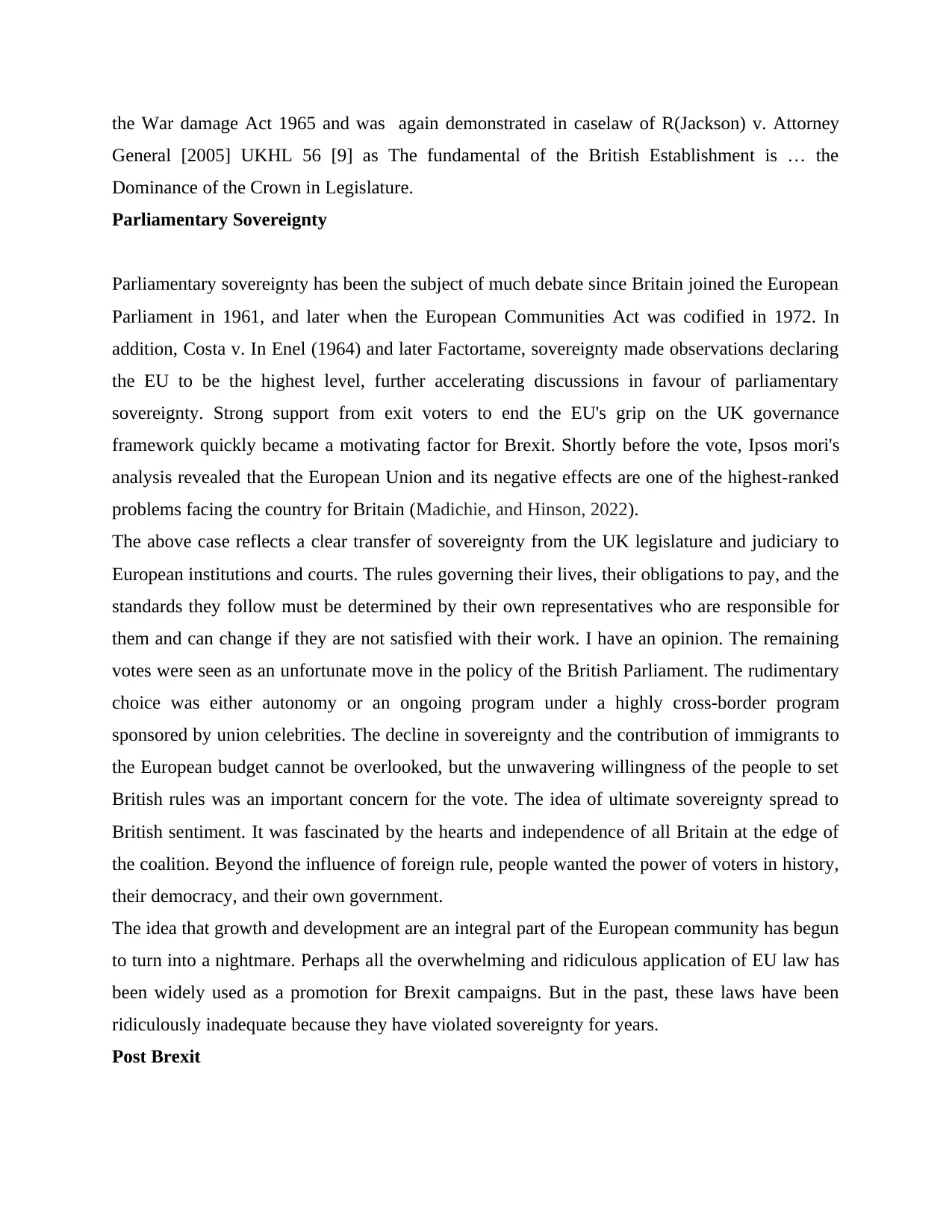
the War damage Act 1965 and was again demonstrated in caselaw of R(Jackson) v. Attorney
General [2005] UKHL 56 [9] as The fundamental of the British Establishment is … the
Dominance of the Crown in Legislature.
Parliamentary Sovereignty
Parliamentary sovereignty has been the subject of much debate since Britain joined the European
Parliament in 1961, and later when the European Communities Act was codified in 1972. In
addition, Costa v. In Enel (1964) and later Factortame, sovereignty made observations declaring
the EU to be the highest level, further accelerating discussions in favour of parliamentary
sovereignty. Strong support from exit voters to end the EU's grip on the UK governance
framework quickly became a motivating factor for Brexit. Shortly before the vote, Ipsos mori's
analysis revealed that the European Union and its negative effects are one of the highest-ranked
problems facing the country for Britain (Madichie, and Hinson, 2022).
The above case reflects a clear transfer of sovereignty from the UK legislature and judiciary to
European institutions and courts. The rules governing their lives, their obligations to pay, and the
standards they follow must be determined by their own representatives who are responsible for
them and can change if they are not satisfied with their work. I have an opinion. The remaining
votes were seen as an unfortunate move in the policy of the British Parliament. The rudimentary
choice was either autonomy or an ongoing program under a highly cross-border program
sponsored by union celebrities. The decline in sovereignty and the contribution of immigrants to
the European budget cannot be overlooked, but the unwavering willingness of the people to set
British rules was an important concern for the vote. The idea of ultimate sovereignty spread to
British sentiment. It was fascinated by the hearts and independence of all Britain at the edge of
the coalition. Beyond the influence of foreign rule, people wanted the power of voters in history,
their democracy, and their own government.
The idea that growth and development are an integral part of the European community has begun
to turn into a nightmare. Perhaps all the overwhelming and ridiculous application of EU law has
been widely used as a promotion for Brexit campaigns. But in the past, these laws have been
ridiculously inadequate because they have violated sovereignty for years.
Post Brexit
General [2005] UKHL 56 [9] as The fundamental of the British Establishment is … the
Dominance of the Crown in Legislature.
Parliamentary Sovereignty
Parliamentary sovereignty has been the subject of much debate since Britain joined the European
Parliament in 1961, and later when the European Communities Act was codified in 1972. In
addition, Costa v. In Enel (1964) and later Factortame, sovereignty made observations declaring
the EU to be the highest level, further accelerating discussions in favour of parliamentary
sovereignty. Strong support from exit voters to end the EU's grip on the UK governance
framework quickly became a motivating factor for Brexit. Shortly before the vote, Ipsos mori's
analysis revealed that the European Union and its negative effects are one of the highest-ranked
problems facing the country for Britain (Madichie, and Hinson, 2022).
The above case reflects a clear transfer of sovereignty from the UK legislature and judiciary to
European institutions and courts. The rules governing their lives, their obligations to pay, and the
standards they follow must be determined by their own representatives who are responsible for
them and can change if they are not satisfied with their work. I have an opinion. The remaining
votes were seen as an unfortunate move in the policy of the British Parliament. The rudimentary
choice was either autonomy or an ongoing program under a highly cross-border program
sponsored by union celebrities. The decline in sovereignty and the contribution of immigrants to
the European budget cannot be overlooked, but the unwavering willingness of the people to set
British rules was an important concern for the vote. The idea of ultimate sovereignty spread to
British sentiment. It was fascinated by the hearts and independence of all Britain at the edge of
the coalition. Beyond the influence of foreign rule, people wanted the power of voters in history,
their democracy, and their own government.
The idea that growth and development are an integral part of the European community has begun
to turn into a nightmare. Perhaps all the overwhelming and ridiculous application of EU law has
been widely used as a promotion for Brexit campaigns. But in the past, these laws have been
ridiculously inadequate because they have violated sovereignty for years.
Post Brexit
Paraphrase This Document
Need a fresh take? Get an instant paraphrase of this document with our AI Paraphraser
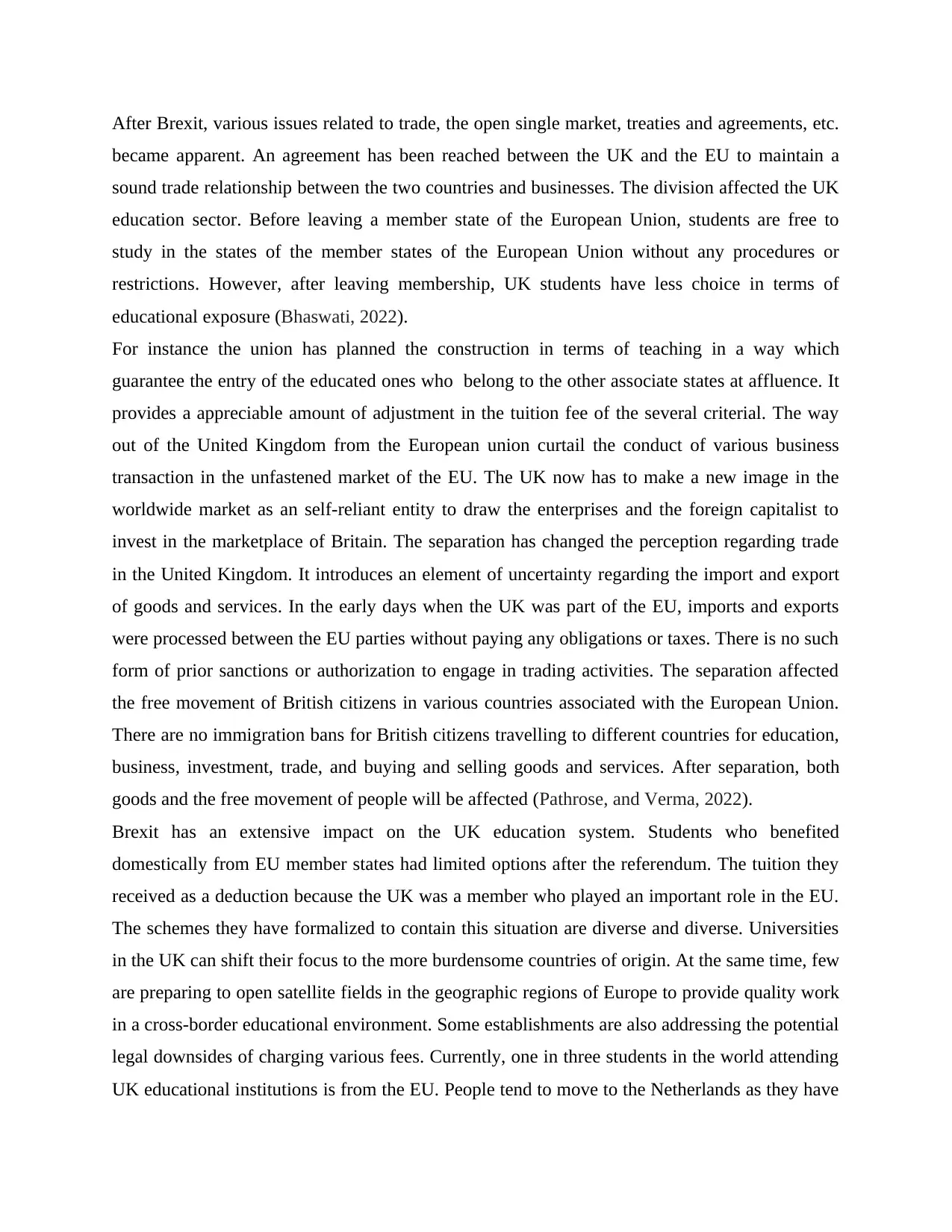
After Brexit, various issues related to trade, the open single market, treaties and agreements, etc.
became apparent. An agreement has been reached between the UK and the EU to maintain a
sound trade relationship between the two countries and businesses. The division affected the UK
education sector. Before leaving a member state of the European Union, students are free to
study in the states of the member states of the European Union without any procedures or
restrictions. However, after leaving membership, UK students have less choice in terms of
educational exposure (Bhaswati, 2022).
For instance the union has planned the construction in terms of teaching in a way which
guarantee the entry of the educated ones who belong to the other associate states at affluence. It
provides a appreciable amount of adjustment in the tuition fee of the several criterial. The way
out of the United Kingdom from the European union curtail the conduct of various business
transaction in the unfastened market of the EU. The UK now has to make a new image in the
worldwide market as an self-reliant entity to draw the enterprises and the foreign capitalist to
invest in the marketplace of Britain. The separation has changed the perception regarding trade
in the United Kingdom. It introduces an element of uncertainty regarding the import and export
of goods and services. In the early days when the UK was part of the EU, imports and exports
were processed between the EU parties without paying any obligations or taxes. There is no such
form of prior sanctions or authorization to engage in trading activities. The separation affected
the free movement of British citizens in various countries associated with the European Union.
There are no immigration bans for British citizens travelling to different countries for education,
business, investment, trade, and buying and selling goods and services. After separation, both
goods and the free movement of people will be affected (Pathrose, and Verma, 2022).
Brexit has an extensive impact on the UK education system. Students who benefited
domestically from EU member states had limited options after the referendum. The tuition they
received as a deduction because the UK was a member who played an important role in the EU.
The schemes they have formalized to contain this situation are diverse and diverse. Universities
in the UK can shift their focus to the more burdensome countries of origin. At the same time, few
are preparing to open satellite fields in the geographic regions of Europe to provide quality work
in a cross-border educational environment. Some establishments are also addressing the potential
legal downsides of charging various fees. Currently, one in three students in the world attending
UK educational institutions is from the EU. People tend to move to the Netherlands as they have
became apparent. An agreement has been reached between the UK and the EU to maintain a
sound trade relationship between the two countries and businesses. The division affected the UK
education sector. Before leaving a member state of the European Union, students are free to
study in the states of the member states of the European Union without any procedures or
restrictions. However, after leaving membership, UK students have less choice in terms of
educational exposure (Bhaswati, 2022).
For instance the union has planned the construction in terms of teaching in a way which
guarantee the entry of the educated ones who belong to the other associate states at affluence. It
provides a appreciable amount of adjustment in the tuition fee of the several criterial. The way
out of the United Kingdom from the European union curtail the conduct of various business
transaction in the unfastened market of the EU. The UK now has to make a new image in the
worldwide market as an self-reliant entity to draw the enterprises and the foreign capitalist to
invest in the marketplace of Britain. The separation has changed the perception regarding trade
in the United Kingdom. It introduces an element of uncertainty regarding the import and export
of goods and services. In the early days when the UK was part of the EU, imports and exports
were processed between the EU parties without paying any obligations or taxes. There is no such
form of prior sanctions or authorization to engage in trading activities. The separation affected
the free movement of British citizens in various countries associated with the European Union.
There are no immigration bans for British citizens travelling to different countries for education,
business, investment, trade, and buying and selling goods and services. After separation, both
goods and the free movement of people will be affected (Pathrose, and Verma, 2022).
Brexit has an extensive impact on the UK education system. Students who benefited
domestically from EU member states had limited options after the referendum. The tuition they
received as a deduction because the UK was a member who played an important role in the EU.
The schemes they have formalized to contain this situation are diverse and diverse. Universities
in the UK can shift their focus to the more burdensome countries of origin. At the same time, few
are preparing to open satellite fields in the geographic regions of Europe to provide quality work
in a cross-border educational environment. Some establishments are also addressing the potential
legal downsides of charging various fees. Currently, one in three students in the world attending
UK educational institutions is from the EU. People tend to move to the Netherlands as they have
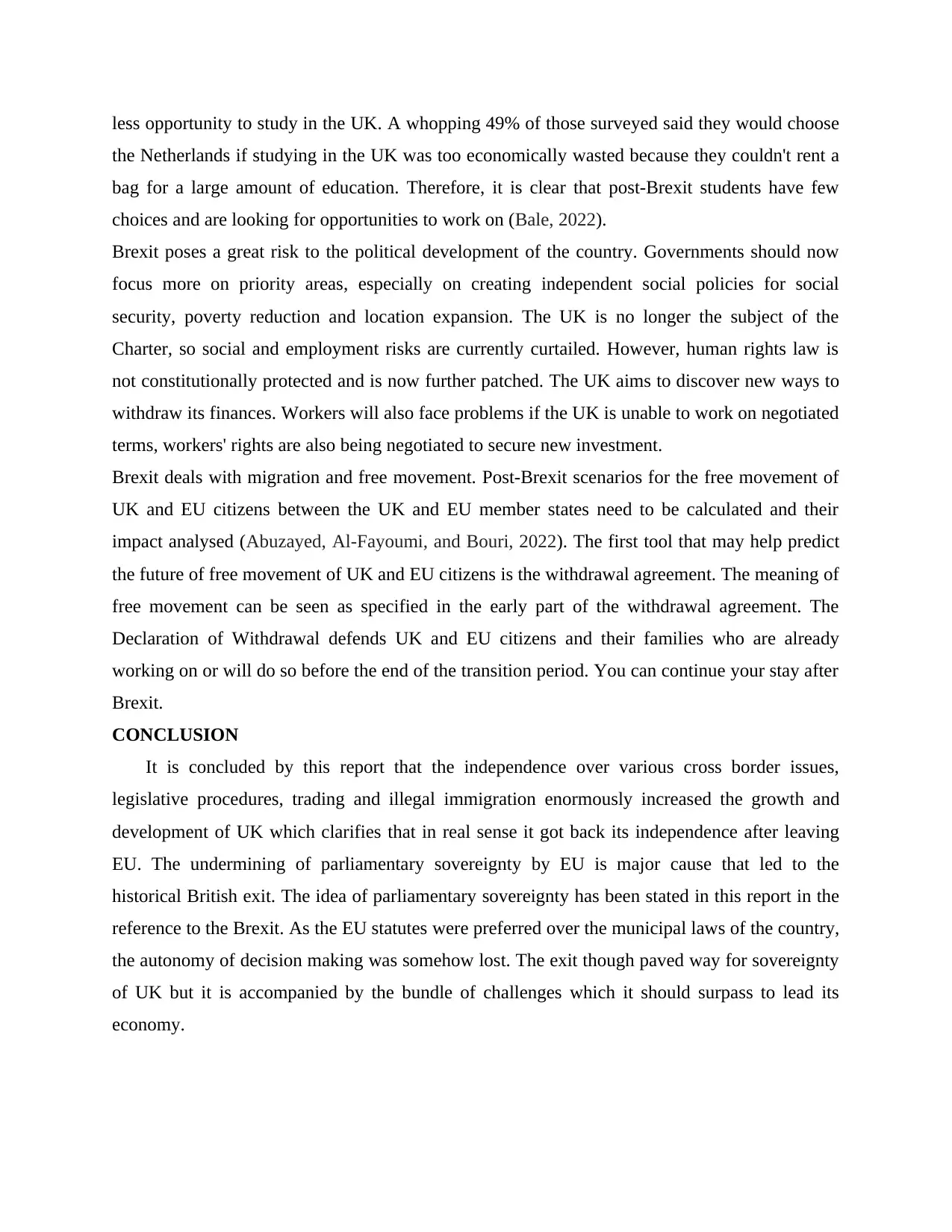
less opportunity to study in the UK. A whopping 49% of those surveyed said they would choose
the Netherlands if studying in the UK was too economically wasted because they couldn't rent a
bag for a large amount of education. Therefore, it is clear that post-Brexit students have few
choices and are looking for opportunities to work on (Bale, 2022).
Brexit poses a great risk to the political development of the country. Governments should now
focus more on priority areas, especially on creating independent social policies for social
security, poverty reduction and location expansion. The UK is no longer the subject of the
Charter, so social and employment risks are currently curtailed. However, human rights law is
not constitutionally protected and is now further patched. The UK aims to discover new ways to
withdraw its finances. Workers will also face problems if the UK is unable to work on negotiated
terms, workers' rights are also being negotiated to secure new investment.
Brexit deals with migration and free movement. Post-Brexit scenarios for the free movement of
UK and EU citizens between the UK and EU member states need to be calculated and their
impact analysed (Abuzayed, Al-Fayoumi, and Bouri, 2022). The first tool that may help predict
the future of free movement of UK and EU citizens is the withdrawal agreement. The meaning of
free movement can be seen as specified in the early part of the withdrawal agreement. The
Declaration of Withdrawal defends UK and EU citizens and their families who are already
working on or will do so before the end of the transition period. You can continue your stay after
Brexit.
CONCLUSION
It is concluded by this report that the independence over various cross border issues,
legislative procedures, trading and illegal immigration enormously increased the growth and
development of UK which clarifies that in real sense it got back its independence after leaving
EU. The undermining of parliamentary sovereignty by EU is major cause that led to the
historical British exit. The idea of parliamentary sovereignty has been stated in this report in the
reference to the Brexit. As the EU statutes were preferred over the municipal laws of the country,
the autonomy of decision making was somehow lost. The exit though paved way for sovereignty
of UK but it is accompanied by the bundle of challenges which it should surpass to lead its
economy.
the Netherlands if studying in the UK was too economically wasted because they couldn't rent a
bag for a large amount of education. Therefore, it is clear that post-Brexit students have few
choices and are looking for opportunities to work on (Bale, 2022).
Brexit poses a great risk to the political development of the country. Governments should now
focus more on priority areas, especially on creating independent social policies for social
security, poverty reduction and location expansion. The UK is no longer the subject of the
Charter, so social and employment risks are currently curtailed. However, human rights law is
not constitutionally protected and is now further patched. The UK aims to discover new ways to
withdraw its finances. Workers will also face problems if the UK is unable to work on negotiated
terms, workers' rights are also being negotiated to secure new investment.
Brexit deals with migration and free movement. Post-Brexit scenarios for the free movement of
UK and EU citizens between the UK and EU member states need to be calculated and their
impact analysed (Abuzayed, Al-Fayoumi, and Bouri, 2022). The first tool that may help predict
the future of free movement of UK and EU citizens is the withdrawal agreement. The meaning of
free movement can be seen as specified in the early part of the withdrawal agreement. The
Declaration of Withdrawal defends UK and EU citizens and their families who are already
working on or will do so before the end of the transition period. You can continue your stay after
Brexit.
CONCLUSION
It is concluded by this report that the independence over various cross border issues,
legislative procedures, trading and illegal immigration enormously increased the growth and
development of UK which clarifies that in real sense it got back its independence after leaving
EU. The undermining of parliamentary sovereignty by EU is major cause that led to the
historical British exit. The idea of parliamentary sovereignty has been stated in this report in the
reference to the Brexit. As the EU statutes were preferred over the municipal laws of the country,
the autonomy of decision making was somehow lost. The exit though paved way for sovereignty
of UK but it is accompanied by the bundle of challenges which it should surpass to lead its
economy.
⊘ This is a preview!⊘
Do you want full access?
Subscribe today to unlock all pages.

Trusted by 1+ million students worldwide
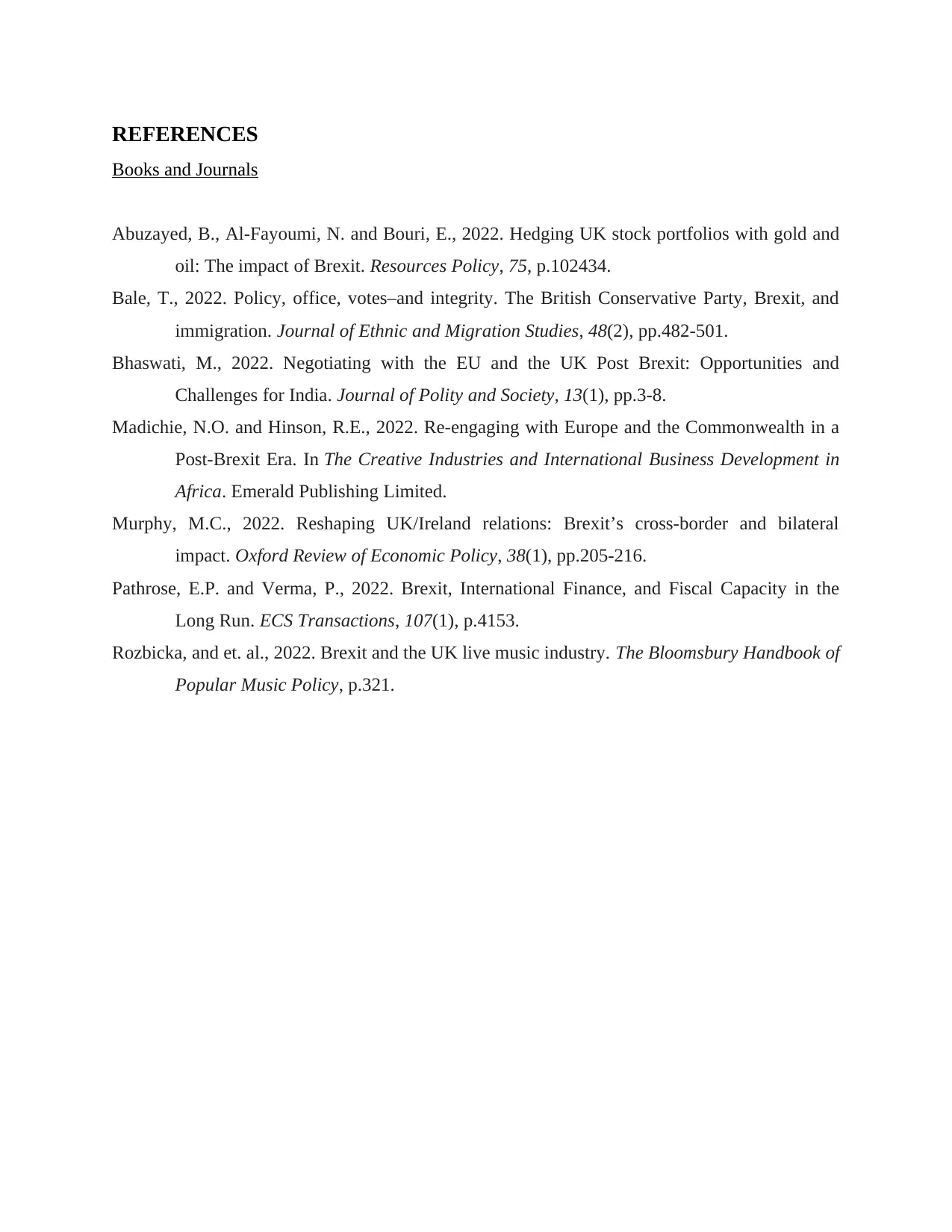
REFERENCES
Books and Journals
Abuzayed, B., Al-Fayoumi, N. and Bouri, E., 2022. Hedging UK stock portfolios with gold and
oil: The impact of Brexit. Resources Policy, 75, p.102434.
Bale, T., 2022. Policy, office, votes–and integrity. The British Conservative Party, Brexit, and
immigration. Journal of Ethnic and Migration Studies, 48(2), pp.482-501.
Bhaswati, M., 2022. Negotiating with the EU and the UK Post Brexit: Opportunities and
Challenges for India. Journal of Polity and Society, 13(1), pp.3-8.
Madichie, N.O. and Hinson, R.E., 2022. Re-engaging with Europe and the Commonwealth in a
Post-Brexit Era. In The Creative Industries and International Business Development in
Africa. Emerald Publishing Limited.
Murphy, M.C., 2022. Reshaping UK/Ireland relations: Brexit’s cross-border and bilateral
impact. Oxford Review of Economic Policy, 38(1), pp.205-216.
Pathrose, E.P. and Verma, P., 2022. Brexit, International Finance, and Fiscal Capacity in the
Long Run. ECS Transactions, 107(1), p.4153.
Rozbicka, and et. al., 2022. Brexit and the UK live music industry. The Bloomsbury Handbook of
Popular Music Policy, p.321.
Books and Journals
Abuzayed, B., Al-Fayoumi, N. and Bouri, E., 2022. Hedging UK stock portfolios with gold and
oil: The impact of Brexit. Resources Policy, 75, p.102434.
Bale, T., 2022. Policy, office, votes–and integrity. The British Conservative Party, Brexit, and
immigration. Journal of Ethnic and Migration Studies, 48(2), pp.482-501.
Bhaswati, M., 2022. Negotiating with the EU and the UK Post Brexit: Opportunities and
Challenges for India. Journal of Polity and Society, 13(1), pp.3-8.
Madichie, N.O. and Hinson, R.E., 2022. Re-engaging with Europe and the Commonwealth in a
Post-Brexit Era. In The Creative Industries and International Business Development in
Africa. Emerald Publishing Limited.
Murphy, M.C., 2022. Reshaping UK/Ireland relations: Brexit’s cross-border and bilateral
impact. Oxford Review of Economic Policy, 38(1), pp.205-216.
Pathrose, E.P. and Verma, P., 2022. Brexit, International Finance, and Fiscal Capacity in the
Long Run. ECS Transactions, 107(1), p.4153.
Rozbicka, and et. al., 2022. Brexit and the UK live music industry. The Bloomsbury Handbook of
Popular Music Policy, p.321.
1 out of 7
Related Documents
Your All-in-One AI-Powered Toolkit for Academic Success.
+13062052269
info@desklib.com
Available 24*7 on WhatsApp / Email
![[object Object]](/_next/static/media/star-bottom.7253800d.svg)
Unlock your academic potential
Copyright © 2020–2026 A2Z Services. All Rights Reserved. Developed and managed by ZUCOL.



